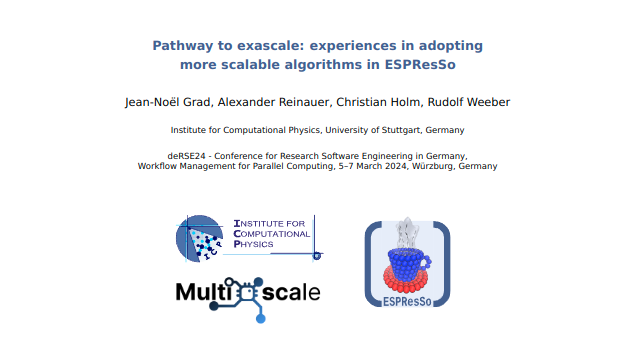Author: Jean-Noël Grad
The German RSE association (de-RSE) organises a yearly event to foster synergies between RSEs from different fields. This year the conference was located at the Faculty of Mathematics and Computer Science of the University of Würzburg. It attracted 190 participants and featured 131 contributions organised in 6 parallel sessions. There were four tracks dedicated to software provisioning, performance optimization and HPC infrastructure. Speakers shared their experiences leveraging supercomputers with heterogeneous architectures, managing HPC simulation workflows with Snakemake, downloading scientific software via EESSI, conducting large-scale refactoring of C/C++/CUDA code with Coccinelle, and building interoperable and cross-platform parallel applications.
Alexander Puck Neuwirth explained how the EESSI[1] stack benefits HPC clusters, cloud-based services and desktop/laptop users. Jean-Noël Grad shared his experience improving the scalability of the software ESPResSo with applications in energy storage for MultiXscale[2] and using the EESSI GitHub Action to automatically test software and executable papers in the cloud. Dörte Carla Sternel presented the NHR Alliance, a German HPC organisation that assists domain scientists in applying for compute time, organises HPC conferences and summer schools, and provides HPC training via courses, workshops and fully-funded three-year PhD scholarships.
During the Teaching RSE session, participants were invited to brainstorm strategies to institutionalise the education of RSEs in Germany. While HPC-RSEs have access to a wide selection of training courses offered by supercomputing facilities on the topics of parallel programming, performance analysis, and modern CUDA/C++/Fortran software design, generalist RSEs can have a more difficult time finding non-specialised training opportunities. Existing graduate programmes are typically part of a computer science, data science or HPC specialisation, or are tightly integrated to domain-specific courses, such as bioinformatics.
Building upon the definition of the RSE skillset[3] and survey of relevant graduate programs and teaching resources[4], participants explored ideas to better integrate RSE training in existing academic curricula, identify transferable RSE skills that could be part of a course syllabus, and propose ways to train and support RSE teaching staff. The session notes will be summarized in a whitepaper, which will be open for contributions from the RSE community[5].
Many contributions to deRSE24 covered topics that MultiXscale actively engages in, such as improving software parallel performance, portability and provisioning, offering users training, and lowering the barrier to entry in the HPC world. The conference abstracts and slides can be obtained from the event website[6] and the associated Zenodo community[7].
References:
[1] Dröge et al. “EESSI: A cross-platform ready-to-use optimised scientific software stack”. In: Software: Practice and Experience 53(1), 2023. doi:10.1002/spe.3075
[2] Grad, Weeber, “Report on the current scalability of ESPResSo and the planned work to extend it”. MultiXscale Deliverable, Zenodo, 2023. doi:10.5281/zenodo.8420222
[3] Goth et al. “Foundational Competencies and Responsibilities of a Research Software Engineer”, arXiv preprint 2311.11457 [cs.SE], 2023. doi:10.48550/arXiv.2311.11457
[4] Learning and Teaching RSE – Better Software, Better Research, https://de-rse.org/learn-and-t
[5] The teachingRSE project, https://github.com/CaptainSiff
[6] https://events.hifis.net/event
[7] https://zenodo.org/communities

![]()

